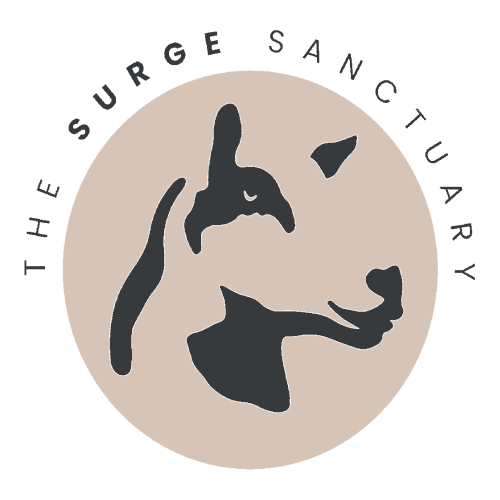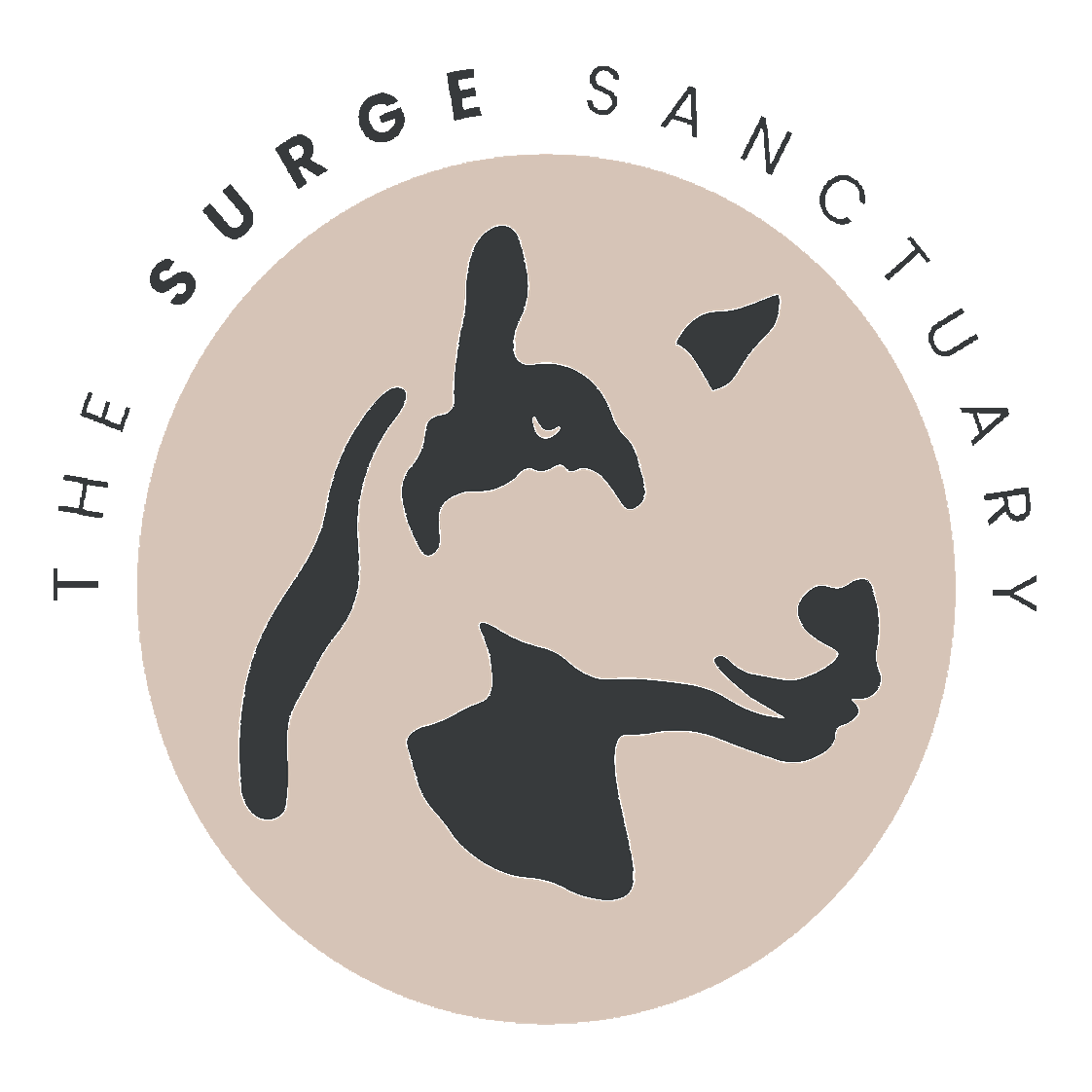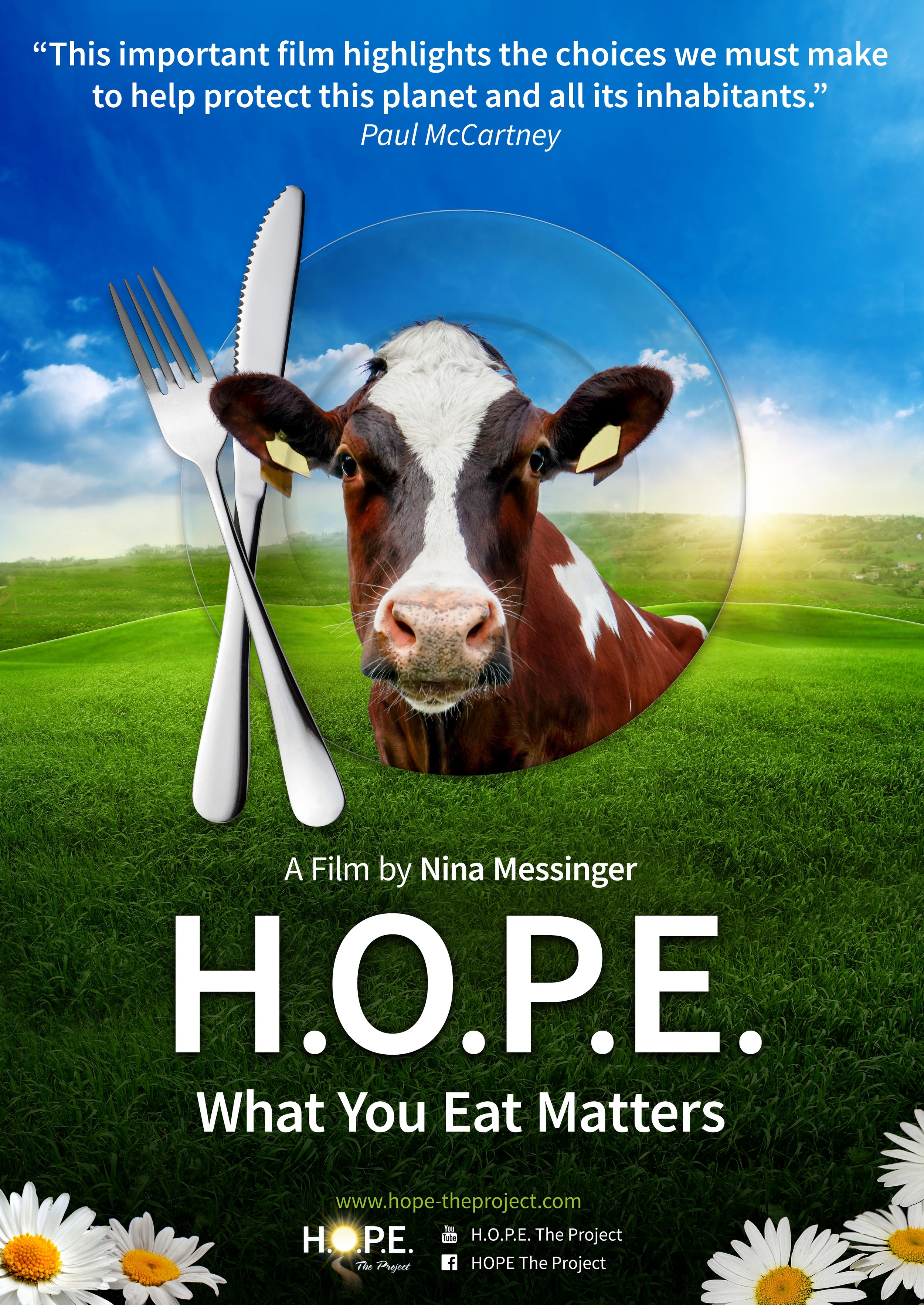H.O.P.E. What You Eat Matters: Q+A with filmmaker Nina Messinger
Today’s blog is an interview conducted with Austrian filmmaker Nina Messinger. Nina’s documentary ‘H.O.P.E. What You Eat Matters’ uncovers “the effects of the typical Western diet on our health, the environment, and animals. The film has a clear message: By changing our eating habits, we can change the world.”
1. Have you always been vegan? What made you going vegan? Was there a particular moment where you decided to switch to a plant-based diet?
I was vegetarian for 20 years and gradually reduced the consumption of dairy products and eggs. Since 2010 I’m vegan. Especially ethical considerations but also health reasons led me to a plant-based diet.
A traumatic experience in my childhood laid the foundation for this diet. When I was eight years old, I witnessed the slaughter of a cow. I could see the cow’s fear in her eyes, I heard the bold shot, I saw all that blood pouring out of her body and witnessed how her extremities were dissevered. It was in this moment that I realised that every single piece of meat on my plate originated from an animal that was violently killed. This awareness never left hold of me and led me to change my eating habits step by step. The more I learnt about it the more I realised how beneficial a plant-based diet is for our health. I experienced it with my own body. I suffered from psoriasis and a whole-food, plant-based diet helped me to get rid of it. My migraines, too, disappeared almost completely because of my diet and I felt fitter, more vital and more at peace with myself. Plus, I want to age in a healthy way and I know that your diet is an important factor in this matter.
2. What made you get so involved with animal rights, health and the environment? When did it become a matter of heart? And finally, when did you decide to make the film about these topics?
Animals were my main motivation. Not only dogs and cats but also the so-called livestock, for example the docile and most social cattle or the intelligent, sensible, and surprisingly adaptive pigs. I don’t want them to suffer and die for me.
I began to realise that a diet based on animal products is questionable, not only because of ethical reasons but also because of health and climate reasons. Today’s diseases of civilisation are attributed to a diet based on animal products in a large part. The ever-growing production of animal feed is partly made from genetically manipulated monocultures as well as the agonising factory farms that destroy our environment, increase world hunger, and cause harm to the climate. After these fairly complex coherences became clear to me, I began to search for ways to communicate them in a matter preferably easy to understand. That’s how the idea to make a film came up.
3. Making a good film is quite a challenge and involves so many tasks. You made this great film with lots of different themes, interviews and information. How did you learn how to write a script and how to make a film?
I didn’t have any experiences with film productions. I’m a newcomer and self-taught filmmaker. The vision to make a film was that strong and clear, that I just had to make it happen. Now I know: If you’re really passionate about something, everything is possible.
4. How much time passed from the first idea to the final film?
The idea of making a film occurred to me when I was working on my book called Du sollst nicht töten! – Plädoyer für eine gewaltfreie Ernährung (in English: Thou shalt not kill! - Plea for a non-violent diet). In 2012, I gave the first interview regarding the film. The cinema tour started in May 2016.
5. What challenges did you face when making the film?
At the beginning, I clearly underestimated the time required as well as the organisational, technical and financial effort. It was quite the challenge to master these problems and being able to engage convincing interviewees for my film was another challenge.
The greatest challenge I faced producing this film was the extreme difficulty of obtaining filming permits for factory farm facilities. This problem did not occur with vegetable or fruit farmers. I found that questionable and surprising at the same time. Should we not all have the right to see how and where our food is being produced? If we are not allowed to see how our food is made, do we really want to eat it?
6. The film covers different topics such as our health, climate and environment, and intensive livestock farming. What are the reasons behind the order/structure of the film?
It was my intention to produce a film that looks at the multiple intertwined themes regarding our diet from different perspectives. That leads to the opportunity to not treat these topics separately from each other and in a stiff order but to demonstrate their connectedness right from the beginning. There are numerous reasons that speak for a plant-based diet and people become vegan because of many different reasons. A part of that is to change one’s own perspective and instead pay attention to the animals’ perspective. This helps to look at the human actions in another way.
7. What made you decide to offer the film free of charge?
My original intention when making this film was to make its message accessible to as many people as possible. I want to save the lives of innumerable people and animals and contribute to the protection and preservation of the basis of our existence, which is nature.
Now everyone has the opportunity to watch the film on the Internet anytime, anywhere, to share it on social media, or to organise free screenings.
8. In your opinion, what is necessary to raise the awareness of more people towards a plant-based and vegan diet?
It’s important to explain over and over again that a vegan diet is not about sacrifice. It’s a win that benefits your own health, the environment, the animals and the entire human kind. It’s important to demonstrate how much people harm themselves, the environment, animals and humanity by following a diet mostly consisting of animal products.
9. What did you learn during making the film that you didn’t know before? Was there anything that surprised you the most?
Getting to know all the health enhancing aspects of a plant-based diet was the biggest learning experience for me. When I started producing the film, I already knew a wholefood vegan diet rich in variety is markedly healthy. By talking to luminaries like Dr. Caldwell B. Esselstyn, Prof. Dr. T. Colin Campbell or Prof. Dr. Claus Leitzmann I learnt that a well-planned, vegan diet can not only prevent numerous diseases but can also stop them in many cases and at times even heal them. A whole-food, plant-based diet is a powerful weapon against many diseases and beside exercise and good social contacts the central foundation for a healthy and vital life.
The extent and intensity of the animals’ suffering in factory farming, which can only be described as an extremely brutal and systematic animal abuse, was another new awareness. Despite all obstacles and difficulties this realisation made me continue towards finishing the film.
10. Many shots at the end of the film show animals in sanctuaries. What experiences have you had visiting sanctuaries and with the animals living there?
The days of shooting in sanctuaries affected me deeply and stirred me up because there I could see how happy, intelligent and amiable the animals can be if we give them the possibility to actually live their lives. For me it was shocking to see how these few animals saved from animal factories flourished more and more in sanctuaries each day and how they showed endless joy for living and gratefulness so soon. Everyone who meets those animals can feel it and I could read off the visitors’ and caretakers’ faces and their body language that they, too, had a feeling of happiness because of the animals. Our society could benefit endlessly from such relations, characterized by mutual love and caring, between humans and animals, if we’d finally begin to treat animals as fellow creatures.
11. In your opinion, what role do sanctuaries play in our society? How can we bring more people to visit and support sanctuaries?
Sanctuaries are places of togetherness, of dignity, of respect, and of empathy. They not only change our relations to animals but also the relationships between us humans. Sanctuaries are schools of a peaceful and caring togetherness. They heal our souls and make us happier. If we tell other people about sanctuaries and explain the benefits people could gain for themselves and others, some of them may support sanctuaries and advocate for mandatory financial support by the state.
12. It must have been really hard to watch the material about factory farming and slaughterhouses. What gives you hope?
Yes, that’s right. I had lots of sleepless nights. However, the pain helped to open my eyes and to realise how much suffering there is behind every piece of meat and every package of cheese even when it seems like both wave at me apparently harmlessly and appetisingly from the shelves in supermarkets. Pain and sorrow can be important and powerful motors for change if we understand their causes and their consequences and become aware of how useful they are. We can stop the suffering farm animals go through and the devastating consequences of a diet based on animal products because we, humans, don’t depend on the consumption of animal products to live a healthy life. My hope is that more and more people realise this and that they choose a healthier, more fulfilling, and more peaceful life that is based on compassion and dignity towards all living beings.
13. Are other projects planned for the future?
I am working on a few ideas and also have an idea for another film. I allow myself to be led by my heart to know which project wants to be realised next. The commonality of all my project ideas is the need to help people understand the advantages of a conscious, empathetic, and sustainable diet and lifestyle.
To find out more about the film and watch it for free, head over to the following pages:
More about Nina Messinger:
Nina Messinger is an Austrian author, independent filmmaker, and founder of H.O.P.E. The Project.
Since 2006, she has worked as a speaker, trainer and seminar organiser in the health sector with focus on nutrition, exercise and mental wellness.
In June 2011, Smaragd Verlag published Nina´s first book, Du sollst nicht töten! Plädoyer für eine gewaltfreie Ernährung (Thou shalt not kill! Plea for a non-violent diet; The book is only available in German)
In 2016 Nina released her first documentary, Hope for All. Unsere Nahrung – Unsere Hoffnung in a nationwide theatrical release in Germany. Hope for All is available in all German-speaking countries as DVD, Blu-ray and download. From 2016 to 2017, Nina worked on the English version of her documentary titled H.O.P.E. What You Eat Matters, which is now available all over the world for free and has been watched over a million times.
In 2018 she started H.O.P.E. The Project to create awareness about the vital importance of a whole food, plant-based diet and of living a healthy, sustainable and compassionate lifestyle.
Following on from the success of H.O.P.E. What You Eat Matters, Nina and her team created a short film series called Plant Power Stories. The series aims to inform and inspire people and features individuals whose lives have been completely transformed by changing their eating habits. For the latest episodes, and more information on Nina and the project, please visit www.hope-theproject.com for more information.
Mika Sing is a Surge Media volunteer, currently studying a bachelor’s in English Language & Literature and Dramatics in Munich, Germany. She’s interested in using film and journalism to raise attention to animal rights and veganism.




